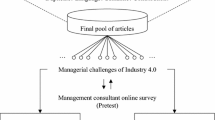Abstract
We explore the extent to which the current technological trend, dubbed Industry 4.0, might increase forms of control inside organisations, by focussing on pivotal firms in the so-called Italian Motor Valley currently embracing its adoption. We find that Industry 4.0 technologies open up great possibilities for incorporating the three forms of control identified by Orlikowski (Account Manag Inf Technol 1(1):9–42, https://doi.org/10.1016/0959-8022(91)90011-3, 1991), i.e. personal, bureaucratic, and social, into technological artefacts, often blending them together. If, on the one hand, this implies a technical and theoretical feasibility of enforcing forms of ‘Big Brother’ surveillance within the boundaries of organisations, and thereby of the workplace, on the other hand, the actual achievement of these possibilities depends on the organisational environment within which the new technologies are implemented.
Similar content being viewed by others
Notes
See ‘Big data meets Big Brother as China moves to rate its citizens’. Wired (online), 21 October 2017. url: https://www.wired.co.uk/article/chinese-government-social-credit-score-privacy-invasion.
References
Alvesson, M., & Sveningsson, S. (2003). Good visions, bad micro-management and ugly ambiguity: Contradictions of (non-)leadership in a knowledge-intensive organization. Organization Studies, 24(6), 961–988. https://doi.org/10.1177/0170840603024006007.
Burawoy, M. (1985). The politics of production: Factory regimes under capitalism and socialism. Brooklyn: Verso.
Carugati, A., Leclercq-Vandelannoitte, A., & Cunha, J. V. (2018). Work control and surveillance in the age of digital. In F. Cantoni & G. Mangia (Eds.), Human resource management and digitalization. New York: Routledge-Giappichelli.
Casilli, A. A. (2017). Digital labor studies go global: Toward a digital decolonial turn. International Journal of Communication, 11, 3934–3954.
Child, J. (2000). Managerial strategies, new technology and the labour process. In I. McLoughlin, D. Preece, & P. Dawson (Eds.), Technology, organizations and innovation: Theories, concepts and paradigms. London: Taylor & Francis.
Cirillo, V., Rinaldini, M., Staccioli, J., & Virgillito, M. E. (2018). ‘Workers’ intervention authority in Italian 4.0 factories: Autonomy and discretion’. LEM working papers series no. 13/2018. http://www.lem.sssup.it/WPLem/2018-13.html. Accessed 17 May 2019.
Corbin, J., & Strauss, A. L. (1990). Grounded theory research: Procedures, canons and evaluative criteria. Qualitative Sociology, 13(1), 3–21. https://doi.org/10.1007/BF00988593.
Dosi, G., Nelson, R. R., & Winter Sidney, G. (2001). The nature and dynamics of organizational capabilities. Oxford: Oxford University Press. https://doi.org/10.1093/0199248540.001.0001.
Dosi, G., & Virgillito, M. E. (2019). Whither the evolution of the contemporary social fabric: New technologies and old socio-economic trends. LEM working papers series no. 2/2019. http://www.lem.sssup.it/WPLem/2019-02.html. Accessed 17 May 2019.
Glaser, B. G., & Strauss, A. L. (1967). The discovery of grounded theory: Strategies for qualitative research. Aldine de Gruyter.
Grint, K., & Woolgar, S. (1997). The machine at work: Technology, Work and Organization. Polity.
Harrison, B. (1994). Lean and mean: The changing landscape of corporate power in the age of flexibility. Basic Books.
Huws, U. (2014). Labor in the global digital economy: The cybertariat comes of age. New York: Monthly Review Press.
Kärreman, D., Sveningsson, S., & Alvesson, M. (2002). The return of the machine bureaucracy? - Management control in the work settings of professionals. International Studies of Management and Organization, 32(2), 70–92.
Knights, D., & Willmott, H. (1990). Labour process theory. Basingstoke: Palgrave Macmillan. https://doi.org/10.1007/978-1-349-20466-3.
Morozov, E. (2013). To save everything, click here: The folly of technological solutionism. PublicAffairs.
Noble, D. F. (1986). Forces of production: A social history of industrial automation. Oxford: Oxford University Press.
Orlikowski, W. J. (1991). Integrated information environment or matrix of control? The contradictory implications of information technology. Accounting, Management and Information Technologies, 1(1), 9–42. https://doi.org/10.1016/0959-8022(91)90011-3.
Oxford English Dictionary. (2019). Control. OED Online: Oxford University Press. https://en.oxforddictionaries.com/definition/control. Accessed 17 May 2019.
Pennings, J. M., & Woiceshyn, J. (1989). A typology of organizational control and its metaphors. In M. B. Bacharach & N. Ditomaso (Eds.), Research in the sociology of organizations. Greenwich: JAI Press.
Roy, D. (1952). Quota restriction and goldbricking in a machine shop. American Journal of Sociology, 57(5), 427–442. https://doi.org/10.4324/9781315193854-10.
Rubery, J., & Grimshaw, D. (2001). ICTs and employment: The problem of job quality. International Labour Review, 140(2), 165–192. https://doi.org/10.1111/j.1564-913x.2001.tb00219.x.
Thompson, P. (2003). Fantasy Island: A labour process critique of the ‘age of surveillance. Surveillance and Society, 1(2), 138–151.
Varian, H. R. (2014). Beyond big data. Business Economics, 49(1), 27–31. https://doi.org/10.1057/be.2014.1.
Wright, E. O. (2000). Class counts. Cambridge: Cambridge University Press. https://doi.org/10.1017/cbo9780511488917.
Zuboff, S. (2015). Big other: Surveillance capitalism and the prospects of an information civilization. Journal of Information Technology, 30(1), 75–89. https://doi.org/10.1057/jit.2015.5.
Acknowledgements
The authors wish to thank the editors of the special issue and one anonymous referee, Giovanni Dosi, Francesco Garibaldo, and participants to the Workshop “A new Industrial Revolution? Labour, Technology and the Automotive Industry” (2018, Pisa, Italy), for helpful comments and insightful suggestions at various stages of this work. The authors wish to thank the Claudio Sabattini Foundation (Bologna, Italy) and the Institute of Economics of Scuola Superiore Sant’Anna (Pisa, Italy) for their support during field work. Maria Enrica Virgillito acknowledges support from European Union’s Horizon 2020 research and innovation programme under Grant agreement no. 822781 GROWINPRO—Growth Welfare Innovation Productivity.
Funding
H2020 Societal Challenges (Europe in a changing world - Inclusive, innovative and reflective societies) (822781).
Author information
Authors and Affiliations
Corresponding author
Additional information
Publisher's Note
Springer Nature remains neutral with regard to jurisdictional claims in published maps and institutional affiliations.
Rights and permissions
About this article
Cite this article
Moro, A., Rinaldini, M., Staccioli, J. et al. Control in the era of surveillance capitalism: an empirical investigation of Italian Industry 4.0 factories. J. Ind. Bus. Econ. 46, 347–360 (2019). https://doi.org/10.1007/s40812-019-00120-2
Received:
Revised:
Accepted:
Published:
Issue Date:
DOI: https://doi.org/10.1007/s40812-019-00120-2




